 |
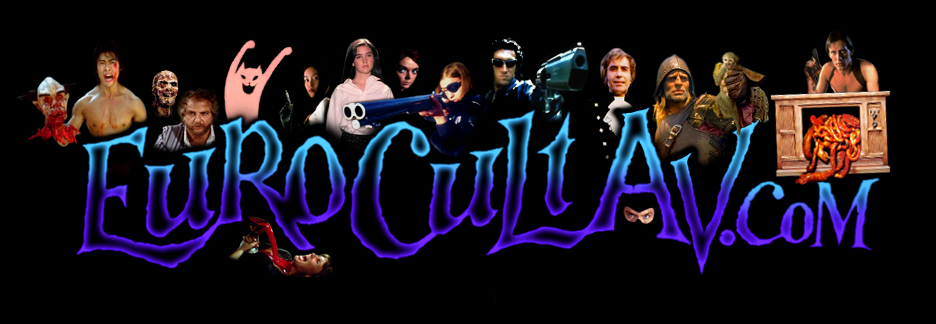 |
|
|
 |
 |
|
Twilight Time Zone #6
By Bobby Morgan & Scott MacDonald
|
 |
|
|
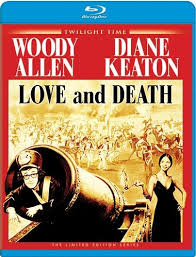 |
 |
 |
|
 |
|
Love and Death
Director- Woody Allen
Cast- Woody Allen, Diane Keaton
Country of Origin- U.S.
Discs-1
Reviewer- Scott MacDonald
This month's Twilight Time Zone column as per usual grabs from their recent slate to bring you a number of this great label's releases. We begin this month with a pair of titles from the director Woody Allen. We begin with the February 2015 release of Love and Death, which could be categorized as one of his "earlier, funnier movies" made reference to in Stardust Memories, before taking a look at the January 2015 Blu-ray release of the later Allen film the Purple Rose of Cairo.
Love and Death stars Woody Allen as Boris Grushenko, an intellectual young man who would rather make love than war, and this gets him ridiculed by his family during Napoleon's invasion of Russia. Forced to fight, he ends up being the only survivor during his time in conflict, and thus becomes a reluctant war hero. His cousin with whom he is in love, Sonja, agreed to marry him (reluctantly) if he survived, and as he did they become married. Expecting a dreadful existence, Sonja learns to love Boris, but their life is threatened by the presence of Napoleon so the pair decide to assassinate the dictator to stabilize their existence and save Russia!
Love and Death is Woody Allen's madcap send up of Russian Literature, and philosophy. A lot of the humor present in the dialogue is quite intellectual, and the movie has a tendency to pause around these deep philosophical and literary conversations between characters that in another movie would be played as deep and serious. These moments in Love and Death are used as sheer comedy. Moments like this are juxtaposed with great moments of physical humor and straight up zany comedy. Admittedly, the middle portion of the film tends to bring things down to a crawl, but the ending subplot involving the Napoleon assassination closes things out with a hilarious bang. While the film itself tends to have Russian literature as it's primary target, I did note quite a few allusions to the work of Ingmar Bergman, an early inspiration to Allen. These range from the obvious call backs like the Seventh Seal and the Magician to more subtle moments like Boris' childhood flashbacks channeling the flashback sequences in Bergman's Wild Strawberries.
Twilight Time's Blu-ray of Love and Death is a sight to behold. The DVD of the same film released a decade earlier was a muddy mess, The Blu-ray, however offered in an AVC encoded 1080p 1:85:1 transfer offers as nice an image as I've seen with the film. The transfer has a nice organic feel to it with excellent fine detail, stable colors, and a healthy level of film grain present. The audio for the film is presented with a DTS-HD Mono track in English which is also quite serviceable with dialogue, score, and effects coming through nicely. There aren't much in the way of extras here, but Woody Allen is notorious in regards to not participating in his own releases. There is the now-famous Twilight Time isolated score, and 2 trailers, the theatrical and the MGM 90th anniversary variation.
The Film (4/5)
A/V (4/5)
Extras (1.5/5)
|
|
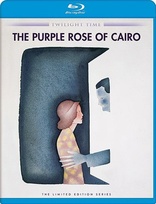 |
|
|
 |
 |
|
 |
|
The Purple Rose of Cairo
Director- Woody Allen
Cast- Mia Farrow, Jeff Daniels
Country of Origin- U.S.
Discs-1
Reviewer- Scott MacDonald
The Purple Rose of Cairo has long been documented as one of Woody Allen's favorites among his own films. It is a wonderful blend of drama, comedy, and a touch of the surreal in concept and execution. The film stars former Allen muse Mia Farrow as Cecilia, a woman living in depression-era New Jersey and working badly as a waitress while her out of work husband Monk (Danny Aiello) gambles away her paycheck, and sneaks around behind her back with other women. She wants to live freely, but cannot do so, and frustrated with the circumstances of her life, she throws herself into the cinema. She spends most of her free time at the local movie theater "The Jewel" obsessing over the latest and greatest Romantic Comedies of the era. One day while viewing the latest film the theater has to offer "The Purple Rose of Cairo," a background character from the film, Tom Baxter, steps down from the screen to sweep Cecilia off her feet.
That alone is enough of a premise for one film, but Purple Rose of Cairo is not content with a simple love story. Allen delves into the complications that arise from the presence of Tom Baxter leaving the screen and being in our reality. These range from the characters left on screen who must now sit around aimlessly until his return. We have to deal with the Hollywood creatives behind Purple Rose from the producers of the film, to the actor who played him ,Gil, who does not want a duplicate of his person running around causing potential trouble. Trouble, however, is something that happens from the get-go such as the moment when Tom tries to take Cecilia to a fancy restaurant only to realize that the money he had on screen is of no value in the real world leaving the two to have to run from the restaurant without paying their tab. Of course, there is the matter of Cecilia's husband Monk, who may not treat her well, but certainly does not want to be upstaged by another man, especially when that man is an on-screen fiction.
As has been documented by the director himself, Allen's earlier films were indeed "funnier" than his later ones. However, Allen throughout his career has managed a magnificent balancing act of creating both great comedy and fantastic drama. On occasion though, and Purple Rose of Cairo is certainly one of those occasions, he balances both the drama and the comedy, and injects an element of whimsy. This makes Purple Rose of Cairo one of Allen's most potent films. That being said it is also that balancing act that makes the film all the more tragic, and is one of the reasons that despite loving the film, I find myself rarely returning to it.
Purple Rose of Cairo has been presented in an AVC encoded 1080p 1:85:1 transfer that while not perfect is far better than I've ever seen the film look previously. The film comes to Blu-ray with a nice natural look with great to excellent fine detail, solid blacks, and accurate flesh tones. There is a healthy level of grain present through the film. There are elements of damage to the source, nothing overly distracting, but it is certainly a presence during the runtime. The audio is presented with a DTS-HD MA track in English, with the dialogue and score coming through nicely. I did not detect issues with pops, cracks, or hissing on the track. Once again, and not unexpected there are no extras outside of a pair of trailers, and an isolated score.
The Film (4.5/5)
A/V (3.5/5)
Extras (1.5/5)
|
|
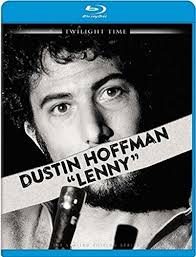 |
|
|
 |
 |
|
 |
|
Lenny
Director-Bob Fosse
Cast-Dustin Hoffman, Valerie Perrine, Jan Miner
Country of Origin - U.S.
Discs-1
Reviewer - Bobby Morgan
After winning the Best Director Oscar for Cabaret the late Bob Fosse set his sights on adapting Julian Barry's highly acclaimed Broadway play Lenny, based on the life and career of the legendary controversial stand-up comedian Lenny Bruce, for the big screen. Barry's services were retained to turn his stage show into a workable screenplay Fosse could then use to build an unconventional biographical motion picture (or "biopic" if you will) around. Cliff Gorman, who earned raved reviews for playing Bruce in the play, was not considered bankable enough of a name to headline a risky feature film, so after Al Pacino was briefly considered the role was given to Dustin Hoffman. No stranger to taking on parts for which he might have once been rejected, Hoffman turned out to be the actor born to bring the firebrand funnyman, who had died from a drug overdose in August 1966, back to life through Fosse's direction.
Lenny spares us the conventional beats and tropes of the cinematic biography to give us a portrait of a legend beginning at the time in his life when he was finally starting to realize his potential to the moment when it was all taken away in a flash. Bruce broke new ground for comedy and the use and examination of language in American society almost every time he took the stage before a nightclub audience or went in front of a television to entertain and enlighten housebound crowds all across the country. He also seemed to gain new fans every time he performed, but it was the enemies he made with his fearless and frothingly hilarious sets that ultimately brought Lenny Bruce to his knees. Towards the end of his life he found himself in and out of court on countless obscenity charges and the hypocrisy he experienced while watching judges, prosecutors, policemen, and other servants of law poorly attempt to deconstruct his intentions with the linguistic choices that landed him in hot water time and again seeped into his act. By the end of his career when Bruce wasn't hazily trying to get through a performance while under the influence of morphine or worse he was reduced to reading aloud the transcripts of his multiple obscenity trials in order to make some sense of why the legal system he believed in was trying to destroy him and everything for which he stood.
Fosse and Barry discard the traditional progression of scenes in biographical films in favor of a jazzy rhythm in the staging and editing that recalls the fast pace and swift tonal shifts you might find in one of Bruce's stand-up performances. They chose Lenny's complicated relationship with Honey (Valerie Perrine), a stripper he marries after a hurried whirlwind courtship, to serve as the emotional core of the film, and it's an effective one. We're never quite sure if these two crazy kids are meant to be together, or if they ever were, but the chemistry between Hoffman and Perrine helps to illustrate the lingering attraction that kept the Bruces a couple for as long as they were. Their relationship took its share of dark turns down winding roads, which Bruce was more than happy to incorporate into his material, until the only thing holding them together was their daughter Kitty. Fosse made the wisest artistic choice to have cinematographer Bruce Surtees (Dirty Harry, Risky Business) shoot the entire film in stark black & white because the presence of color would have distracted from the filmmaker's desire to have Lenny be as unlike traditional biopics as humanly possible.
Hoffman truly embodies Lenny Bruce both as a flawed but decent human being and as a dynamic, uncompromising force in the world of comedy who refused to water down or clean up his material to appeal to a mass audience as many who came before were only too happy to oblige. When he took the stage there was no one better than Bruce, and the impact he made during his brief career influenced generations of comedians and other entertainers and solidified his status as a legend of American humor. During a courtroom scene audio is played of one of Bruce's performances and for a moment I couldn't tell the difference between Hoffman's portrayal and the real deal. The actor is just that good playing Lenny; he nails the man's demonic energy, unmistakable inflections, and Olympic-level leaps from one topic to another without completely throwing off the audience. Perrine's timeless beauty and willingness to match Hoffman's emotional hurtling makes her performance the second most laudable one in the film; you can see why a man like Lenny Bruce would fall in love with her. Fosse stocked the supporting cast with authentic stage performers, comedians, and even a real baliff during one powerful scene where a broken and hopeless Bruce is dragged ranting from a Florida courtroom. Chosen to play Sally Marr, Bruce's mother and a comedian who proved to be one of his greatest influences, was longtime Palmolive spokeswoman Jan Miner. She is pure perfection as the one person who believed in his greatness but was heartbroken at the realization that Lenny would never live to see it fulfilled. Fosse himself makes an uncredited appearance off-camera interviewing Honey, Sally, and others for their contemporary perspectives on Bruce and the legacy he left behind.
Twilight Time's limited edition Blu-ray release of Lenny boasts an impressive 1080p high-definition transfer of the film framed in its original 1.85:1 widescreen aspect ratio. The richness and deep black levels of Surtees' cinematography makes the leap to HD looking better than ever before. Film grain and grit are maintained at a decent amount throughout in order to preserve the documentary-style presentation Fosse wanted, but overall this is the best Lenny has looked on home video to date and I doubt it can get any better. Provided with the greatly improved picture is an English DTS-HD Master Audio 1.0 mono soundtrack that does its job admirably but features its share of muffled, low dialogue that you might have to raise the volume manually in order to hear. During Lenny's stage shows every word comes through with fine clarity and depth. The jazz-heavy soundtrack composed by noted Fosse collaborator Ralph Burns is granted its own crystalline showcase with an isolated English DTS-HD Master Audio 2.0 track. Extra features include an informative commentary with Twilight Time's resident film historians Julie Kirgo and Nick Redman, the original theatrical trailer (3 minutes), and a trailer for MGM's 90th anniversary. Kirgo also provides another fantastic, well-written booklet of liner notes available as an insert.
The Film: 4/5
Audio/Video: 4/5
Extras: 2/5
|
|
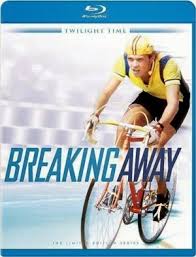 |
|
|
 |
 |
|
Breaking Away
Director-Peter Yates
Cast-Dennis Christopher, Dennis Quaid, Daniel Stern
Country of Origin - U.S.
Discs-1
Reviewer - Bobby Morgan
From the filmmaker who also gave us Bullitt, The Friends of Eddie Coyle, and Krull to name an eclectic few comes the sweet-natured comedy of maturation Breaking Away, a 20th Century Fox title that has been given its first Blu-ray edition courtesy of Twilight Time. For a film that was produced on a low budget over thirty-five years ago with a cast comprised of unknowns and partial-knowns it looks surprisingly strong in high-definition. Despite not having made a peep at the box office when first released Breaking Away was deservedly honored with five Academy Award nominations, winning one for Steve Tesich's original screenplay, and has since cracked the top ten list of the American Film Institute's 100 Most Inspiring Movies as well as coming at #8 on their list of the greatest sports movies. Not bad at all for a scrappy little film with a big heart and a bold spirit just like its memorable characters.
As most of us already know, your whole life is thrown into complete upheaval once you graduate from high school. Unless you have plans to go to college, join the military, or spend a year or so backpacking across Europe you inevitably must face one of the most difficult questions a young adult can encounter: "What now?" For four young inhabitants of the small Indiana university town of Bloomington the answers may be different but not by much. Mike (Dennis Quaid) was never able to build on the promise he once demonstrated as a high school quarterback and that has made him bitter and rebellious towards the arrogant local college students who think they're so much better than the townies, or "cutters" as they're often insultingly referred. Moocher (Jackie Earle Haley) is insecure about his height and thinks that moving to Chicago is the only way he'll ever be able to find work. Cyril (Daniel Stern) is supportive of friends but has no real plans of his own. Then there's Dave (Dennis Christopher), whose passions for bicycling and the culture of Italy have given him purpose as he ventures into adulthood. He also develops an attraction to college student Katherine (Robyn Douglass) but he decides to woo her by posing as an Italian exchange student. Meanwhile the tension between the cutters and the college preppies boils over and the university president takes it upon himself to even the playing field by inviting the townies to participate in the school's annual Little 500 bicycle race. Dave, Mike, Moocher, and Cyril form the team representing their humble hamlet, with Dave doing the majority of the biking, but it's the easiest of the battles they will have to wage when also pressed to figure out what they all want to do with their lives.
Funny, optimistic, and insightful without becoming contrived and cloying, Breaking Away is a splendid human comedy that entertains while also feeling like the honest creation of its makers' souls. Screenwriter Tesich, who would later go on to pen the scripts for Eyewitness and The World According to Garp before dying of a heart attack in July 1996, based the story of Breaking Away on his own real life experiences as a member of the team that won the Indiana University Little 500 race in 1962. The character of Dave was inspired by his teammate Dave Blase right down to the love of bicycling and the Italian culture and language he shares with the film's youthful hero. Tesich draws the humor in his script from the interactions of his characters whose opposing personalities clash in delightful and often dramatic ways. The funniest scenes involve watching Dave's used car salesman father (Paul Dooley) grow increasingly exasperated as his son's fondness for speaking Italian in the house and listening to opera records at top volume ("I'm not 'papa'. I'm your god-damned father!") while his mother (Barbara Barrie) is forced to straddle a very narrow line between appeasing her husband and encouraging his son. She even begins to embrace Dave's love of all things Italian of her own free will. The chemistry between Dave and his friends is authentic and true and during their scenes you often feel like Yates simply called "Action" whenever his lead actors were hanging out shooting the shit.
Christopher's ebullient performance is full of both sunny optimism and the desire to be recognized as an equal by the people he loves and admires, which all but guarantees more heartbreak than he's prepared to handle. His attitude of graceful positivity collides with Quaid's reckless rebel without a clue, Stern's lanky people-pleaser, and the wiry Haley's intense uncertainty, and together they make a winning quartet you root for and not just because it is what is demanded by the dictates of populist filmmaking. Dooley, one of the most character actors there ever was, never plays his part of Dave's father as a broad cartoon but as an average working stiff who can no longer figure out to relate to his only child. He gets most of the funniest dialogue in the Tesich script and makes them ring true, but Dooley's standout moment in Breaking Away is a pivotal dialogue scene with Christopher where the two men finally reach an understanding. From there it's a joy to watch Dooley cheering his onscreen son on during the big race. Forever known as the ultimate coke-snorting 1980's douchebag Ellis from the original Die Hard, it's not much of a shock that Hart Bochner was good playing the leader of the college preppies providing a constant pain in the ass to our townie heroes, but he never comes across as a one-note villain. He's just another guy who doesn't get the cutters. Robyn Douglass is sweet and pretty in her scenes with Christopher, and John Ashton (Beverly Hills Cop), Amy Wright (Wise Blood), P.J. Soles (Halloween), and Peter Moloney (The Thing) make the most of their limited screen time.
Great with extracting wonderful performances from his cast as he was staging action, Yates' direction of Breaking Away is among the best of his career. The bike racing sequences are shot by cinematographer Matthew F. Leonetti (Commando) and edited by Cynthia Scheider (The Legend of Billie Jean) with careful attention paid to capturing the thrilling sensations experienced by Dave whenever he's competing or just simply enjoying a brisk ride around town. The director's command of his performers is even stronger, bringing a warmth and intimacy to the colorful conversations that make up the finest parts of Tesich's script and the film. The scenes are livened up by the presence of a classical music soundtrack comprised of pieces composed by Mendelssohn and Rossini adapted for this film by Patrick Williams and conducted by Lionel Newman, the latter a revered veteran of the 20th Century Fox music department.
Another solid 1080p high-definition transfer from Twilight Time as Breaking Away comes to Blu-ray in a winning presentation framed in its original 1.85:1 widescreen aspect ratio. Grain is kept to a minimum, colors are strong and vibrant, and the rich texture has been preserved and boosted resulting in the finest home video presentation to date of this film. The English DTS-HD Master Audio 1.0 mono track is well-balanced with all components of the sound mix and is very clear and free of distortion, but the dialogue is kept at a volume which isn't too low but still might have you reaching for the remote. English subtitles have also been provided. Twilight Time has rounded up some decent extras for this release, staring off with the wonderful new audio commentary track in which star Christopher is joined by Kirgo and Redman. The actor has plenty of great stories about the production and insights into the creation of his character and the film's enduring appeal. Christopher is also front and center on an audio interview (13 minutes) that appears to have been a lengthy outtake from the commentary where he shares a hilarious and heartfelt story. The classical score is given its own isolated audio track and the extras are rounded off by the theatrical trailer, a pair of vintage television spots, and another booklet of liner notes written by Kirgo.
The Film: 4/5
Audio/Video: 4/5
Extras: 3/5
|
|
|